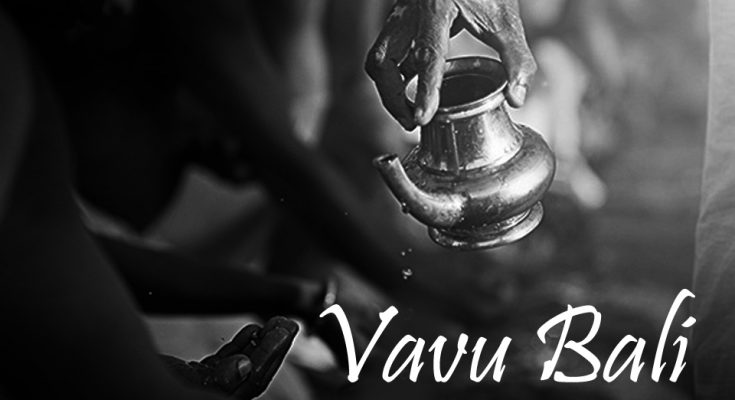Vavu Bali or Vavubali Tharpanam is an important ritual of the Hindus in Kerala. It is an annual homage given to the departed souls and is also referred as Karkkidaka Vavu for the ritual is observed on the Amavasi (New Moon Day) in the Karkkidaka month. The word ‘Karuta Vavu’ in Malayalam means New Moon and ‘Bali’ or ‘Bali Tharpanam’ means offering. Dead ancestors, parents, brothers, sisters, sons and daughters are remembered on this day and the ritual of Bali Tharpanam or Shraddham is done near water bodies – seashore, river banks or ponds.
Significance
Karkkidakam is the last month in the traditional Malayalam calendar ‘Kolla Varsham’. It is believed that on the Amavasi day of Karkkidakam month, the dead souls get full strength and in order to propitiate them and help them achieve Moksha (liberation) the ritual of Bali Tharpanam is observed. Though Bali is performed on the Star/Nakshatra of the departed person, the ritual performed on the Amavasi day in Karkkidakam is considered auspicious and is believed to appease the spirits easily. Amavasi of Karkkidakom also marks the first new moon of Dakshinayanam or the southern transit of the Sun. It is believed to be the night of Devas or Gods. By observing Karkkidaka Vavu ritual, Hindus believe that their Pitrukal or ancestor souls will achieve Moksha and shower blessings to the family members.
Also, according to Vedic Astrology, Sun is the ‘Pitru Karaka’. In the month of Karkkidaka, Sun is in its own constitution and both the Sun and the Moon stay in the same house of the astrological chart on Amavasi, suggesting the presence of paternal and maternal lineages.
Bali Tharppanam or Pitru Tharppanam
The Hindu customs give great importance to the after death rituals. These rituals are commonly called Shesha Kriya (in Malayalam ‘Shesham’ denotes ‘after’ & ‘Kriya’ denotes ‘ritual’). Bali or Pitru Tharppanam is the most important ritual in this, which is observed annually to liberate the souls from all worldly existence and to help them achieve Moksha or eternal peace. In the Hindu custom, when a person dies, the younger ones in the family have to perform Bali/Pitru Tharppanam. Usually, the ritual is observed as per the calculations on the star/nakshatra of the day the person has died. Still, regardless of these calculations, Karkkidaka Vavu Bali is observed and is considered most auspicious.
Bali/Pitru Tharppanam performed on the Amavasi or New Moon Day of Karkkidaka month is referred as Karkidaka Vavu or Vavu Bali. Usually, the day falls in July or August in Gregorian Calendar. On this day, the ritual is observed with great devotion and the rites are conducted near water bodies. Starting from the morning, thousands of people gather on seashores and river banks to conduct this ritual. Temples and religious organisations in Kerala make wide arrangements for the people to perform this ritual. Balippuras or Bali Tharppanam centres will be erected on the banks of holy rivers and seashores. Temples near seashore or river banks arrange special ‘Theertha ghats’ too. The important Bali Tharppanam spots in Kerala such as Shanghumukam Beach Trivandrum, Thiruvallom Parasurama Temple, Varkala Papanasam, Kollam Thirumulavaram, Aranmula, Aluva Manappuram, Thiruvillwamala, Thirunelli, Thirunavaya, Kozhikode Beach, Sri Sundarekhsa Temple Kannur, Thrikunnapuzha etc. will remain crowded on this day and the State authority takes special steps for the safe and peaceful observance of mass Bali Tharppanam.
The ritual
The Vavu Bali ritual is usually done by males, but sometimes, by women and children too. Men wear only a dhoti while performing the ritual; in some areas, a red cloth will be tied around the waist. The person who performs the rites has to wake up early in the morning and finish the morning routines to reach the Bali Tharppanam spot. Also, he has to observe fast on the day and is usually allowed to have only one meal comprising rice. Vavu Bali is conducted under the guidance of a priest or an elderly person. Darbha (a type of grass), cooked rice, pavithram (ring made of darbha), ellu (sesame), cheroola (a herb), water and banana leaf are the important materials required to perform Bali Tharppanam rites. The offering is done on the banana leaf and the person performing the ritual takes a dip in the water, immersing the offering and leaf. The rites and materials slightly vary with various locations. In northern parts of Kerala, people offer Ada (a kind of sweet) to the departed souls at their homes.
Karkkidaka Vavu Bali is analogous to Mahalaya Shraddh Paksha or Pitru Paksha Shraddh observed in other states of India. On the day of Karkkidaka Vavu Bali in Kerala, Hindus in Tamil Nadu observe Aadi Amavasi rites for the devoted souls. Thousands of people take a dip in sacred rivers and important Theerthams on this day.
/div>







